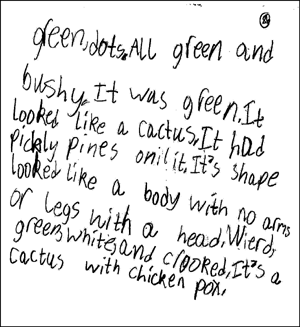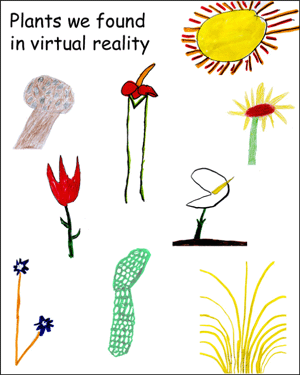| Date |
June 2000 |
|
|
|
|
|
|
| Grade |
2 |
|
|
|
|
|
|
| Subjects |
22 |
|
|
|
|
|
|
| Teacher(s) |
Jarvia Thomas & Kathy Wiedow |
|
|
|
|
|
|
| Application |
The Field, configured so that all eight different plant types could be found in a single sector. |
|
|
|
|
|
|
| Technologies |
ImmersaDesk |
|
|
|
|
|
|
| Pre-investigation activities |
Teachers brought flowers of different sizes, shapes, and colors to class. Class discussed the concepts of similarity and difference with reference to the flowers. Class discussed methods for determining similarity and difference if they were presented with a new field of different flowers, and what tools they would use (crayons and markers). Class discussed the problem of resolving differences among observers. |
|
|
|
|
|
|
| Driving question |
How many different kinds of flowers are there in the Field? |
|
|
|
|
|
|
| Investigation |
 Students were pulled out of class in small groups of 2-3 children, and explored the Field and drew pictures and wrote descriptions of all of the "different" kinds of flowers they could find. Students were pulled out of class in small groups of 2-3 children, and explored the Field and drew pictures and wrote descriptions of all of the "different" kinds of flowers they could find. |
|
|
|
|
|
|
| Post-investigation activities |
 Each group in turn presented a "candidate" new flower, using their drawn pictures and descriptions as evidence. The whole class debated whether each new candidate was really different from previous flowers, or was of the same kind. The process resulted in eight plants being accepted as "different from one another." Each group drew an "archival" image and description of "their plant." The images were collected by the researchers, who produced a composite poster of the images. The children wrote about the activity and took home their description along with a color print of the composite poster Each group in turn presented a "candidate" new flower, using their drawn pictures and descriptions as evidence. The whole class debated whether each new candidate was really different from previous flowers, or was of the same kind. The process resulted in eight plants being accepted as "different from one another." Each group drew an "archival" image and description of "their plant." The images were collected by the researchers, who produced a composite poster of the images. The children wrote about the activity and took home their description along with a color print of the composite poster |
|
|
|
|
|
|
| Assessment |
A brief assessment was given to the students. They were asked two questions:- What did you do?
- What do scientists do when they disagree about their data?
|
|
|
|
|
|
|
| Results |
At a sentential level, student responses to the first question were categorized into one of four classes: (1) social descriptions (e.g., "Judy was in my group"), (2) comments about apparatus (e.g., "we wore these funny glasses"), (3) comments about the exploration process (e.g., "we haven't looked over there yet"), and (4) comments about the phenomena (e.g., "those red flowers look different than the ones we saw before"). Exploration and phenomena comments were twice as prevalent as apparatus comments, supporting the conjecture that the children viewed the activity as a scientific exploration more than interaction with a computer system.
On the second question, the 82% of the children gave the response that when scientists disagree on an observation, they need to go back and observe it again rather than arguing about it. |
|
|
|
|
|
|
| Related publications |
Moher, T., Johnson, A., Cho, Y., Lin, Y. (2001).
First Person Science Inquiry 'in the Field'.
Proceedings of IPT/EGVE 2001,
May 16-18, Stuttgart, Germany, pp. 131-140.
Moher, T., Johnson, A., Cho, Y. (2001).
First-Person Science Inquiry in Virtual Ambient Environments.
Proceedings ACM Conference on Human Factors in Computing Systems (CHI 2001),
Mar 31 - Apr 5, 2001, Seattle, WA, pp. 261-262.
|
|
|
|
|
|
|
 Students were pulled out of class in small groups of 2-3 children, and explored the Field and drew pictures and wrote descriptions of all of the "different" kinds of flowers they could find.
Students were pulled out of class in small groups of 2-3 children, and explored the Field and drew pictures and wrote descriptions of all of the "different" kinds of flowers they could find.  Each group in turn presented a "candidate" new flower, using their drawn pictures and descriptions as evidence. The whole class debated whether each new candidate was really different from previous flowers, or was of the same kind. The process resulted in eight plants being accepted as "different from one another." Each group drew an "archival" image and description of "their plant." The images were collected by the researchers, who produced a composite poster of the images. The children wrote about the activity and took home their description along with a color print of the composite poster
Each group in turn presented a "candidate" new flower, using their drawn pictures and descriptions as evidence. The whole class debated whether each new candidate was really different from previous flowers, or was of the same kind. The process resulted in eight plants being accepted as "different from one another." Each group drew an "archival" image and description of "their plant." The images were collected by the researchers, who produced a composite poster of the images. The children wrote about the activity and took home their description along with a color print of the composite poster